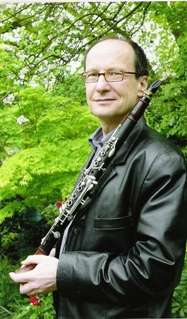|
Back
Rapturous Revelations New York
SubCulture, 45 Bleecker Street
01/16/2014 -
Maurice Ravel: Trio in A Minor
Olivier Messiaen: Quatuor pour la fin du Temps
James Campbell (Clarinet), Gryphon Trio: James Parker (Piano), Annalee Patipatanakoon (Violin), Roman Borys (Cello)

Gryphon Trio: A. Patipatanakoon, J. Parker, R. Borys
(© Michael Gauthier/Freedom Photography)
The rarely-stated fact is that Olivier Messiaen’s Quartet for the end of Time is probably the easiest piece in the whole chamber repertory. Your only necessities? a) An expert quartet of violin, cello, piano and clarinet; b) A succession of deep breath to achieve the right spiritual attitude; c) Follow the dots. Or the notes. Specifically, the notes which Olivier Messiaen laid out in a German prison camp some 70 years ago.
Those are the mechanics. Messiaen, reportedly the most delightful saint among men, a person of infinite courage, compassion and tolerance, would not allow any departures from his score, and no ensemble would even wish to make changes.
Retard a single measure? No, for that would change the complex metrical progressions or palindromic retrogressions. Alter one of the birdcalls? M. Messiaen pursued ornithology as much as music and knew the calls of over 100 birds. Change that very very very slow cello fifth movement to something a bit less...er...slow? That would be heretical. Jesus is One with the Word, and his praise must be as eternal as it is awesome.
In other words, says the composer, don’t mess around with my conception of God, lest ye be condemned to my conception of eternal damnation.
Then again, Messiaen’s religion dwelt purely on the glory of the Eternal, and I doubt if he gave much thought about hell. And while modern apologists have explained the Book of Revelations as a political tract against Rome and certain heretical practices of believers, Olivier Messiaen dwelt on the poetry.
Even more important–absolutely essential–is that “the end of time” does not mean the “finish” of time. Rather, it is close to the Hindu concept of eternity. A beginning, an end, a middle is inconceivable in eternity. Had Messiaen had his druthers, this Quartet would have been like the start of Beethoven’s Ninth, with no real beginning, and it would continue to infinity.
So what makes for a successful performance? First , that it be live: no recording I have ever heard can bring out the resonance, the adoration of the solo instruments. Two, that its audience be as solemn (or quietly ecstatic) as the music.
(That was hardly fulfilled in SubCulture last night, with wheezes, coughs and one cretinous lady applauding after the clarinet celebrated the abyss of time and the glory of the birds.)
But most essential, that the ensemble be not only expert artists in their own right, but that they have the maximum of comfort with their own selves. That they aren’t concerned with others since they have such confidence, and can relate entirely to the music.
That was true with the Toronto-based Gryphon Trio, which, for over two decades, has pushed the boundaries of music in Canada and overseas. Their commissions, their work with dancers and actors, and many recording, have given them an iconic reputation in their own country, and a firm reputation abroad.
I confess never heard them previously, either live or on records, but from the first notes of Ravel’s Trio, it was obvious that this group is superbly comfortable with each other. This is a work not only finesse and charm, but has to be a challenge of balance for these instruments. The group played with such assurance, such clarity, that one swung along with the music. Yes, we have a passacaglia, yes we have a movement where lines separate and come together (Ravel, with his weirdly eclectic knowledge, compared it to the Malayan pantoum poetry). But the Gryphon played it with just the balance of finesse and bits of passion.
At times, Ravel has an excess of loveliness, an eschewing of emotion, but the Gryphon are so familiar that they allowed the lightness to leap out at times.

J. Campbell (© Bruno Schrecker)
Without any programs, and with a youthful audience perhaps not familiar with the Messiaen, it took clarinetist James Campbell to explain the eight movements of the Messiaen, with appropriate live explanations.
That was as deft as his own playing. His name is not quite as well known as Richard Stoltzman, but he is an international soloist and his solo was worthy of any accolades.
The ensemble work here was flawless, as it had to be. But one movement in particular, the aforesaid “Praise to the Eternity of Jesus” was more compelling than any I have ever heard. Cellist Roman Borys was more than eloquent in this long majestic melody. So great was Messian’s inspiration here–and I use this word in its original meaning, to “breathe life”–that Mr. Borys had only to play with as much poignancy as possible to achieve the effects.
The multi-layers of Messian’s work–its modes, colors, birds, religious revelations–are doubtless essential. And the Gryphon Trio with Mr. Campbell had ovviously studied the historical nuances. But listening to it as played last night, with it longing, fulfilling and glorious music, then the earthly mystery of Messiaen and the Divine Mystery of his Church can coalesce in moments of wondrous–and secular–rapture.
Harry Rolnick
|